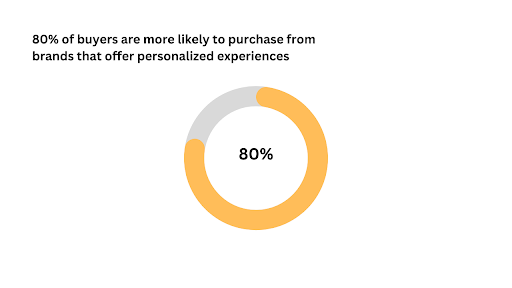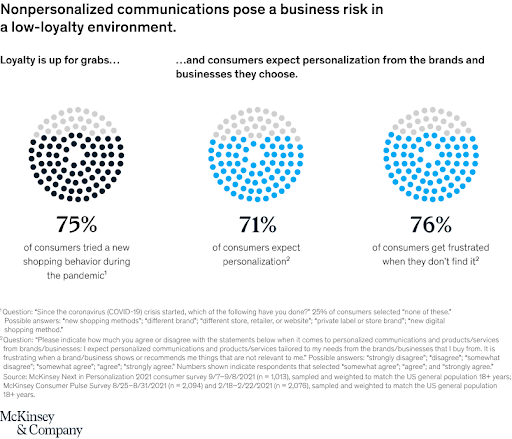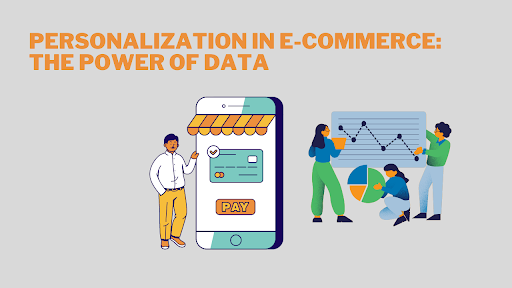E-Commerce is a competitive space and providing an amazing user experience is essential for businesses to succeed.
One powerful strategy to offer your users a great experience is personalization. Tailoring their shopping experience to their preferences and needs is one of the cornerstones of successful e-commerce.
If you can show your customers the things they want to buy right away, it’s the perfect reason for them to stay!
In this article, we will be diving into how personalization can help you enhance your online store and take your business to the next level.
What is Personalization in e-Commerce?

Imagine you walk into a store in your neighborhood and the salesperson already knows your style, size, favorite materials, etc.
This is the level of tailored experiences personalization aims to provide in e-commerce.
In e-commerce, personalization refers to the practice of using data to customize every user’s shopping journey. This requires analyzing customer behavior, purchase history, and preferences to make relevant recommendations.
According to research conducted by Epsilon, 80% of consumers are willing to buy from brands that offer them a personalized experience.
As this research shows, businesses can benefit greatly by investing in personalized experiences for their audience.
How Data Enables Personalization?
In today’s digital landscape, data is the driving force behind effective personalization strategies.
The collection and analysis of customer data, containing browsing behavior, previous purchases, demographic information, and even contextual data like location and device type, help businesses craft tailored experiences.
This data-driven approach empowers businesses to understand customer preferences on a granular level and anticipate their needs.
The Benefits of Data-Driven Product Recommendations

[Image source: McKinsey]
Before we get into the benefits, let’s discuss some of the risks that non-personalized content poses. According to McKinsey, 76% of consumers feel frustrated when they don’t receive a personalized shopping experience.
This can result in businesses losing a ton of potential customers.
Providing a personalized experience for your users powered by data is one of the most effective techniques for e-commerce businesses to build a genuine relationship with them.
Some of the key benefits of data-driven product recommendations are:
Enhanced Customer Engagement
Personalized product recommendations go beyond the one-size-fits-all approach.
By understanding each customer’s unique preferences, you can engage them with products that resonate on a personal level.
When customers see items that align with their tastes and interests, they are more likely to stay on your website, explore further, and ultimately make purchases. This heightened engagement enhances their overall shopping experience, making them feel valued and understood.
And higher customer engagement leads to one of the most valuable things for a business, higher sales, and revenue!
Increased Brand Loyalty
When customers feel that a brand understands their preferences and consistently provides them with relevant recommendations, they’re more likely to develop a strong sense of trust and loyalty.
Personalization builds a deeper connection between customers and your brand, as it showcases your commitment to catering to their individual needs.
This emotional bond leads to repeat purchases and advocacy, as loyal customers share their positive experiences with friends and family. This means that the benefits to your business can compound over the long term and result in massive profits.
Curated Shopping Experience
Imagine walking into a boutique where the displays are tailored to your style and preferences.
Data-driven product recommendations offer a similar curated experience online. By suggesting items based on a customer’s past behavior and preferences, you guide them through a shopping journey that feels personalized and attentive.
This not only makes the shopping process more enjoyable but also increases the likelihood of discovering new items that align with their taste.
Streamlined Navigation and Search
A robust personalized recommendation system can significantly improve the user experience by simplifying navigation and search on your e-commerce store.
Customers can feel overwhelmed by vast e-commerce catalogs, leading to frustration and them leaving the site.
With data-driven recommendations, you can guide customers to relevant products, reducing the time they spend searching and increasing the chances of finding products that match their interests. This streamlining of the shopping process enhances customer satisfaction and encourages conversions.
Using Data Beyond Product Recommendations
The power of data goes much beyond product recommendations.
Businesses can utilize customer data and insights to optimize different aspects of the shopping experience.
Email Marketing
Effective email marketing goes hand in hand with personalization. By leveraging customer data, businesses can send targeted and relevant email campaigns that resonate with individual preferences.
For example, using purchase history and browsing behavior, you can send tailored product recommendations directly to a customer’s inbox.
This not only increases the chances of conversion but also enhances customer engagement with your brand.
Additionally, you can use data-driven email segmentation to send promotions and offers to specific customer segments, maximizing the impact of your marketing efforts.
Social Media Marketing
Data-driven personalization can work wonders when it comes to social media marketing.
By analyzing customer behavior and preferences, you can create highly targeted and relevant social media content.
This includes showcasing products on platforms like Instagram, Twitter, Facebook, or Tiktok that align with a customer’s interests.
Creating content that speaks to their preferences can result in a substantial increase in conversions. Data-driven social media marketing enhances customer engagement, as customers are more likely to interact with content that resonates with them on a personal level.
The Future of eCommerce Personalization
As technology continues to advance, the future of e-commerce personalization holds even more promise.
Machine learning and artificial intelligence are evolving to understand customer preferences at a deeper level. This will eventually be able to provide recommendations that anticipate needs before customers are even aware of them.
Virtual shopping assistants driven by AI could provide real-time guidance and support, mimicking the in-store experience.
The key will be finding the balance between innovative personalization and respecting customer privacy and data security.
Final Thoughts
A very large chunk of online buyers appreciate tailored experiences. Many online businesses are providing personalized recommendations to their customers to increase engagement.
Businesses need to take a customer-first approach to compete in today’s market. Offering a pleasant and easy-to-navigate buying experience can prove to be a massive asset for any business.
Embracing this evolution and finding ways to implement effective data-driven strategies can elevate your online store and set it on a path toward long-term success.

Utkarsh is the founder of The Lamest Blog, a marketer, and software engineer who leverages his diverse skill set to optimize websites, craft engaging copy, and drive organic traffic. He focuses on user satisfaction and combines his technical expertise and creative flair to deliver exceptional digital experiences.









